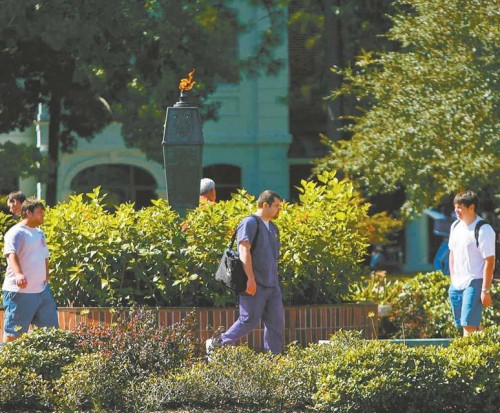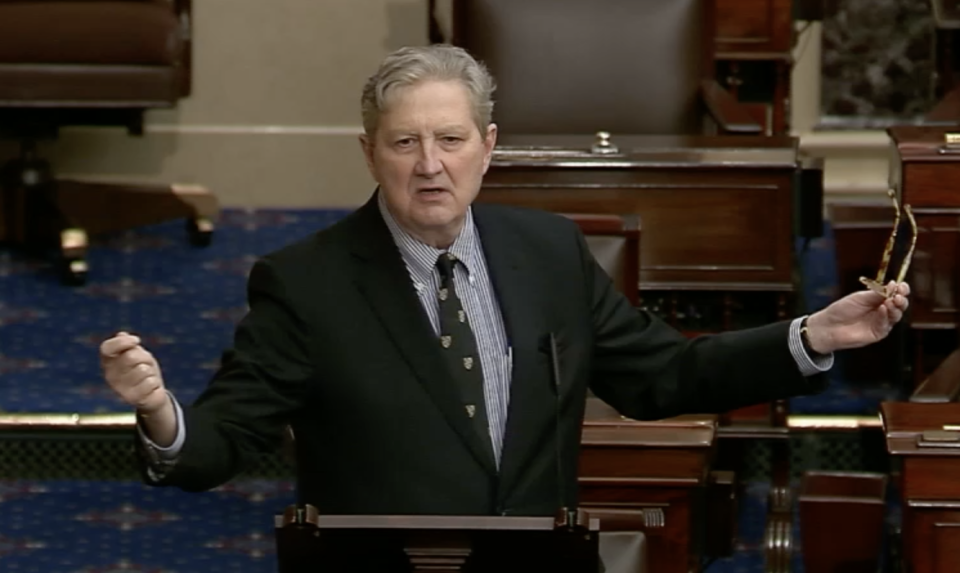14-year-old Lao among THS’s Class of 2011
May 17, 2011Thursday, May 19
May 19, 2011As lawmakers and lobbyists debate in the state capitol during the current legislative session, Nicholls State University President Stephen Hulbert keeps tabs from a distance, watching the many pieces of proposed legislation that will, once sorted, answer a question that has been lingering since last fall.
In advance of the session, of which the main goal is to eradicate a $1.6 billion state budget deficit, Nicholls’ officials have waited to see the impact on higher education and, by proxy, their university.
Last fall, Hulbert began speaking of potential budget cuts in excess of $10 million, but until the outcome of the lawmaking session, and subsequently the amount of state funds dedicated for use in higher education, the exact amount cannot be determined.
“The answer to your question is we have no idea what’s going on in Baton Rouge today,” Hulbert said during a 45-minute interview in his office Friday. “No one does. Much of this is politics. Much of this is election-year politics. …There is no way we can determine the outcome because we don’t know what is going on in terms of the negotiations, the political strategy, the gamesmanship that is going on in Baton Rouge.”
An attempt to determine the impact on Nicholls’ budget is akin to piecing together a puzzle within a puzzle, sans access to the big picture and most of the pieces. But as to whether the picture is one of a Band-Aid or one of grim details, a clue could come soon.
Gov. Bobby Jindal’s oft-criticized approach has been to reduce the budget shortfalls, namely in the higher education and health care sectors, with one-time money. But H.R. 27, a complementary proposition that would allow lawmakers to determine how to spend that money, could have an inversely dramatic impact on higher education.
The proposed rule, scheduled for a debate on the House floor today, would require a two-thirds vote in the Legislature to spend one-time money.
Hulbert said he is “very concerned” with the proposition that could nullify any relief higher education would find, and the university’s legislative liaison said the outcome of H.R. 27 would determine just how much of a budget slash Nicholls would sustain.
“If they say it takes two-thirds vote to spend one-time money, then it would really hit health care and higher ed, the two big entities that rely on discretionary funding without the dedicated funding that most have.” said Larry Howell, the university’s legislative liaison and executive vice president. “That one would really hit hard.
“Specifically for Nicholls, I don’t know what that would mean, but it would be a considerable amount.”
However, the result of H.R. 27 is but a segment of the higher education budget rectification. A cause that would draw the ire of students and parents, and one that Hulbert has frequently spoken in favor of, is the removal of a tuition break that allows students to forego paying for more than 12 hours at a university.
H.B. 448, endorsed by Jindal and sent to the House Education Committee, would raise the tuition cap to 15 hours. Howell said Nicholls is currently forgoing 18 percent of tuition revenue because of the cap.
“You name a business that can cut 18 percent off the top, keep getting all sorts of budget cuts and then expect them to still deliver the same quality of product,” Hulbert said. “It is just simply unreasonable. What it is, it’s politics.”
The Nicholls president expressed his dismay for the prevalence of political agendas in determining the vitality of the state’s education system. He depicted them as preying on the masses with sound bites without substance and said that tuition is being “held down politically and artificially.”
Even with the language in the 2010 Grad Act, which allows schools to increase their tuition by 10 percent each year in return for hitting performance-indicating benchmarks, Nicholls will not be able to charge the southern regional average until 2035, the university president said. Howell said Nicholls is currently at 35 percent of that average.
“Everybody looks at colleges as being inefficient,” Hulbert said. “I’ve been listening to this for 20 years, calls from legislators and governors for greater efficiency out of institutions at the same time budgets are cut. It seems to me to be an absolute contradiction to expect greater productivity, greater efficiency while budgets are being cut and tuition is being held down. It seems to be a political statement. It does sound good for the media and for the general public, but at some point in time, you’re going to find you have an empty program.
“When our state is at the bottom of so many…lists in terms of our performance you have to wonder at what point in time does the public realize state government is accountable for that too, not just education?”
In addition to tuition increases scheduled for next year via the Grad Act, if the tuition cap would be raised to 15 hours, Nicholls would be projected to bolster its self-generated revenue by $6.3 million from last year to $35.1 million total, Howell said.
Howell provided several other figures to demonstrate the university’s burden:
The schools self-generated income totaled $24 million in 2007-2008 and $28.8 million in 2010-2011.
Complementary to the self-generated income, the state support dwindled from $35.8 million in 2007-2008 to $22.5 million in 2010-2011. The latter does not include $7.4 million in one-time stimulus funds that the university does not expect to be renewed.
In addition to the cuts, the overall budget dropped $1.4 million over the same span. NSU’s total budget was $58.5 million in 2010-2011. Approximately 117 positions were cut in the four-year span.
Unfunded mandates – the cost of operating the university – increased $4.3 million over the past four years. Of that total $3.3 million was due to increases in retirement and health care costs and $1 million is the loss of a state grant that helped the university increase its nursing graduate totals.
The legislative liaison said that if Jindal’s budget were to pass, Nicholls would receive an increase in state funding from $22.5 million in 2010-2011 to $26.7 million next year.
Between the tuition cap legislation and the governor’s budget, if the one-time income were to be used on higher education and health care, Nicholls could offset $10.5 million of the originally stated $10.8 million budget shortfall, according to Howell.
The NSU president continued his verbal assault on state government as the conversation transitioned into talks about the threat of a university merger. Legislators, on an issue also endorsed by Jindal, are considering the merger of the University of New Orleans and the Southern University at New Orleans.
Hulbert said he has “no fear whatsoever” that Nicholls is in danger and said anything that suggests the contrary is the lawmakers opposed to the merger trying drum up fear and enhance the merger’s opposition.
“We’re never going to fall in that crack,” Hulbert said. “The issues about whether there are other institutions that are going to be in trouble, that’s politics. That’s all politics again.”
The Advocate in Baton Rouge reported last week that state Rep. Robert Johnson, D-Marksville, said Nicholls and LSU at Alexandria were potentially going to be looked at regarding mergers and closures.
The Nicholls president refused to comment on the UNO-SUNO merger and added that he would not allow the unsubstantiated comments to draw him into a political debate.
“That is an urban agenda in terms of how to effectively serve that population,” Hulbert said. “That’s something that needs to be decided within the legislature, the Jindal Administration and the New Orleans area. We do not have a dog in that hunt, and we’re not getting engaged in that conversation, and we’re not being dragged in by the silliness of saying, ‘Other institutions will be next.'”
He predicated his denial of vulnerability with details of the institution’s economic impact and its regional servitude, something he has rehashed throughout the budget crisis.
“Last count, $279 million a year impact to our service region and a considerably higher impact on a personal level. Eighty-nine percent of our graduates in the last 10 years are still here, paying taxpayers, and contributing to the region. That’s the nature of the institution.
“Nicholls exists to serve a population that is still place bound,” he continued. “Sixty-two percent of our freshman this past fall were still first generation. Many of our students don’t have the ability to travel any longer – they’re traveling long enough distances to get to Nicholls, and they don’t have the ability to travel more or work more to pay for housing at a distance and anything else.”
Hulbert and Howell painted a rosy picture concerning the institution’s standing with the state’s executive branch. Through its partnership with L.E. Fletcher Technical Community College, they said, Nicholls and Fletcher officials have been invited to make presentations on the process of pioneering a regional partnership.
Both Fletcher and Nicholls acknowledge its counterpart’s identification cards and parking passes, Fletcher students are allowed to utilize Nicholls resources and the technical college has full use of the Theodore “Teddy” Duhe Building in Houma and absorbed a cardiopulmonary care class from Nicholls a few years ago.
It’s not a partnership that has resulted in increased funding, but it does provide organic relief to both post-secondary schools.
“We both serve the same region and have the same goals, but it doesn’t bring Fletcher any money to do that job and it doesn’t bring Nicholls any money,” Hulbert said. “But in fact, by partnering, we get the job done better, and you have to do that because the money isn’t there to pay the programs. You have to do it through partnerships to cut corners. And it works.”
All of the uncertainty and higher education budgetary woes, when do they end?
“We ask that question every day,” Hulbert said. “We are in what is referred to across K-12 and higher education as a period of new normal. And the new normal is chaotic. We don’t know.”
Nicholls State University is facing up to a $10.8 million budget shortfall for the 2011-2012 school year. University President Stephen Hulbert said he is watching the legislative session from a distance, as the actions taken by the state’s politicians will determine how much of the shortfall can be accounted for. COURTESY PHOTO













